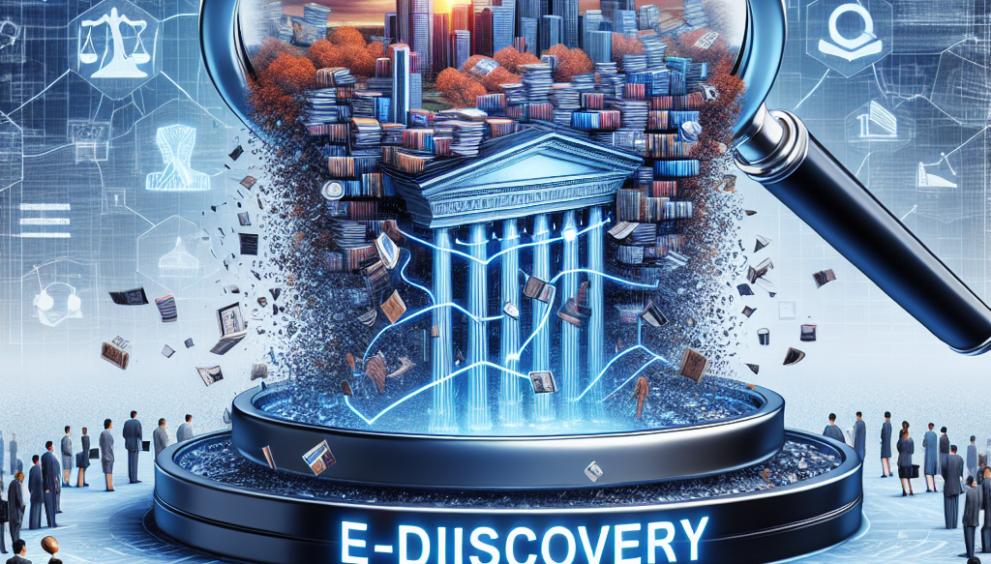How E-Discovery is Changing the Litigation Landscape

-
Table of Contents
- Introduction
- E-Discovery Tools: Revolutionizing Document Review
- The Impact of Artificial Intelligence on E-Discovery
- Cost Efficiency: E-Discovery’s Role in Reducing Litigation Expenses
- Data Privacy Concerns in E-Discovery Processes
- The Shift to Remote E-Discovery: Challenges and Solutions
- E-Discovery Compliance: Navigating Legal and Ethical Standards
- Conclusion
Introduction
E-Discovery, or electronic discovery, is revolutionizing the litigation landscape by transforming how legal professionals gather, analyze, and present evidence in court. As the volume of digital data continues to grow exponentially, the traditional methods of discovery are becoming increasingly inadequate. E-Discovery leverages advanced technologies and tools to streamline the process of identifying, collecting, and reviewing electronic information, such as emails, documents, and social media content. This shift not only enhances efficiency and accuracy but also introduces new challenges related to data privacy, security, and compliance. As a result, legal practitioners must adapt to this evolving environment, embracing innovative strategies to navigate the complexities of modern litigation.
E-Discovery Tools: Revolutionizing Document Review
E-discovery tools have revolutionized the document review process in legal cases, making it faster and more accurate. In the past, reviewing documents involved a lot of time and effort, as teams had to go through large stacks of paper and emails. This not only took a long time but also increased the risk of mistakes. Now, with e-discovery technology, legal professionals can quickly manage large amounts of data with precision.
Key Points:
- Advanced Algorithms and Machine Learning:
- E-discovery tools use smart algorithms to automatically sort and analyze documents.
- Predictive coding allows the software to learn from past data, helping it find relevant documents faster and reducing the need for manual reviews.
- Integration of Artificial Intelligence:
- AI can read the context of documents and identify sensitive or privileged information.
- This automation lets legal teams focus on more important tasks, improving their overall effectiveness.
- Enhanced Collaboration:
- Many e-discovery platforms operate in the cloud, allowing multiple users to access and review documents at the same time.
- This feature is especially helpful for remote teams, making collaboration smoother.
- Thorough Searches Across Datasets:
- E-discovery tools enable complex searches using filters such as date ranges, keywords, and metadata.
- This functionality helps find important information that might be overlooked, strengthening case development.
- Ongoing Technological Advancements:
- As new technologies emerge, e-discovery tools will continue to improve, making document review even more efficient.
- Legal professionals using these tools will be better prepared to tackle the complexities of litigation, leading to better outcomes for clients.
The Impact of Artificial Intelligence on E-Discovery
Artificial intelligence (AI) has greatly transformed e-discovery, changing how legal professionals collect, review, and analyze electronic evidence. In the past, this process was slow and required many attorneys and paralegals to manually go through large amounts of data. Now, with AI, the process is faster and more accurate, allowing legal teams to focus on important strategic tasks.
Key Points:
- Speed and Efficiency:
- AI can analyze large amounts of data much faster than humans.
- Machine learning helps quickly find relevant documents, speeding up the initial review.
- AI uses natural language processing to understand context and recognize patterns in language.
- Improved Accuracy:
- AI tools use predictive coding to learn from past reviews and improve their accuracy over time.
- Legal teams can train AI with examples of what’s relevant and what isn’t, making the review process smoother.
- This not only saves time but also reduces costs, making e-discovery easier for all law firms.
- Compliance and Risk Management:
- AI helps legal teams follow complex data privacy laws by identifying sensitive information, like personal details.
- This ensures compliance and reduces the risk of accidental data leaks, protecting clients’ interests.
- Enhanced Collaboration:
- AI tools offer user-friendly dashboards and visual analytics that simplify presenting findings.
- This promotes better teamwork among legal professionals, clients, and other stakeholders, enhancing communication and decision-making.
- Future Developments:
- As AI technology advances, it will introduce new features to e-discovery, continuing to reshape the legal field.
- Legal professionals should be ready to adapt and embrace these changes to remain competitive and achieve better outcomes for clients.
Cost Efficiency: E-Discovery’s Role in Reducing Litigation Expenses
E-discovery has become a game-changer in the world of litigation, especially when it comes to reducing costs. Traditionally, gathering and reviewing documents for legal cases was a time-consuming and expensive process. However, with e-discovery tools, this process has become more efficient, helping law firms and clients save money.
Key Points:
- Automation of Document Management:
- E-discovery software quickly indexes and categorizes electronic data.
- This speeds up the review process and reduces the need for extensive manual labor, lowering labor costs.
- Law firms can focus more on legal analysis rather than administrative tasks.
- Advanced Analytics and AI:
- Tools that use predictive coding and machine learning prioritize documents based on relevance.
- This targeted approach minimizes the volume of materials that need thorough review, saving time and money.
- It also helps ensure that important evidence is not overlooked, leading to better legal strategies.
- Enhanced Collaboration:
- Cloud-based platforms allow attorneys to access and share documents in real-time from anywhere.
- Improved communication and decision-making reduce the need for in-person meetings and travel expenses.
- This connectivity contributes to overall cost savings.
- Early Case Assessment:
- E-discovery tools can provide insights into a case’s strengths and weaknesses early on.
- This allows attorneys to make informed decisions about settlement or trial strategies, potentially avoiding costly litigation.
- Identifying key issues early helps clients save money on prolonged legal battles.
- Competitive Advantage for Law Firms:
- Firms that adopt e-discovery tools enhance their operational effectiveness and stand out in the market.
- Clients are more likely to choose firms that demonstrate a commitment to reducing litigation expenses.
You May Also Like: E-Discovery Fundamentals: Key Steps and Best Practices for Big Data Management
Data Privacy Concerns in E-Discovery Processes
As legal cases increasingly rely on electronic discovery (e-discovery), it’s important to consider the data privacy issues that come with it. E-discovery involves collecting and reviewing large amounts of electronic data, often containing sensitive personal information. Finding the right balance between conducting thorough investigations and protecting individual privacy rights is crucial.
Key Points:
- Unauthorized Access to Confidential Information:
- E-discovery can accidentally expose sensitive data.
- Legal teams often handle various digital communications, increasing the risk of data breaches.
- Strong protocols are necessary to protect data during e-discovery.
- Evolving Regulatory Landscape:
- Laws like the General Data Protection Regulation (GDPR) and California Consumer Privacy Act (CCPA) set strict rules for handling personal data.
- Legal teams must collect only necessary data and ensure it’s relevant to the case.
- Understanding these legal requirements is vital for compliance.
- Ethical Responsibilities:
- Attorneys have a duty to keep client information confidential.
- Legal professionals must ensure their practices don’t compromise individual privacy.
- Regular training on data privacy best practices is essential for legal teams.
- Impact of AI and Machine Learning:
- AI can improve the efficiency of e-discovery but may also complicate data privacy.
- Algorithms might accidentally include sensitive information that should be left out.
- Legal teams need to monitor AI outputs to comply with privacy standards.
- Balancing Investigation and Privacy:
- While e-discovery makes investigations more efficient, it raises important privacy concerns.
- Legal professionals must strike a balance between thorough investigations and protecting individual rights.
- Implementing strong data protection measures and following regulations is key to safeguarding privacy.
The Shift to Remote E-Discovery: Challenges and Solutions
The move to remote e-discovery has changed how legal teams handle litigation. This shift allows access to large amounts of electronic data from anywhere, but it also brings some challenges. Understanding these challenges and how to address them is key to successful remote e-discovery.
Key Points:
- Data Security and Confidentiality:
- Remote e-discovery can lead to data breaches and unauthorized access.
- Legal teams need strong security measures, like encryption and secure access protocols.
- Training on data protection practices is essential to protect client information and uphold legal standards.
- Communication and Collaboration:
- Virtual meetings can make communication and strategy development harder.
- Legal teams are using advanced collaboration tools to improve this.
- Technologies like video conferencing, project management software, and cloud platforms help keep teams connected, no matter where they are.
- Managing Large Volumes of Data:
- Handling large amounts of data in complex cases can be overwhelming remotely.
- Many firms are using artificial intelligence (AI) and machine learning to make this easier.
- These tools can automate sorting and identifying relevant documents, saving time and resources in the e-discovery process.
- Reevaluating Workflows:
- Remote e-discovery encourages legal teams to be more flexible and responsive.
- Using agile methods can improve efficiency and create a culture of ongoing improvement.
- Regular check-ins and feedback help teams adapt to remote work and stay competitive.
- Future Implications:
- The challenges of remote e-discovery can be managed with strong security, collaboration tools, and new technologies.
- This change improves legal processes and helps firms serve clients better in a shifting environment.
- The lessons learned now will shape future e-discovery practices, making them more efficient and effective.
E-Discovery Compliance: Navigating Legal and Ethical Standards
E-discovery is a key part of litigation, changing how legal professionals gather and analyze electronic evidence. As businesses increasingly rely on digital communication, it’s essential to understand the legal and ethical standards that guide e-discovery. This knowledge helps maintain the integrity of the judicial process and effectively manage client interests.
Key Points:
- Legal Frameworks:
- Legal professionals must follow regulations like the Federal Rules of Civil Procedure, which outline responsibilities for e-discovery.
- These rules highlight the need to preserve relevant information and collect it in a clear and defensible manner.
- Strong data management practices are essential for compliance and anticipating potential challenges.
- Ethical Obligations:
- Attorneys must adhere to ethical codes that require honesty and diligence.
- They need to prevent “spoliation” of evidence, which is the destruction of relevant data.
- Establishing clear protocols for preserving data ensures that all team members understand their roles and responsibilities.
- Technological Advances:
- New software tools have transformed how e-discovery is conducted.
- Legal professionals must use these tools in ways that comply with laws and ethical guidelines.
- It’s important to understand the strengths and weaknesses of technology to protect client confidentiality and data security.
- Global Considerations:
- With companies operating globally, legal teams must understand different countries’ e-discovery laws.
- Knowledge of international regulations, such as the General Data Protection Regulation (GDPR), is crucial.
- Strategies should align with both domestic and international laws for effective and compliant e-discovery practices.
- Balancing Compliance and Ethics:
- E-discovery compliance requires balancing legal duties with ethical responsibilities.
- Legal professionals should be proactive in navigating these complexities as technology and data grow.
- Cultivating a culture of compliance and keeping up with changing legal standards is vital for successful e-discovery.
Conclusion
E-Discovery is transforming litigation by streamlining the gathering and analysis of electronic evidence. Moving from paper-based to digital formats has increased efficiency and reduced costs, allowing quicker identification of relevant documents. Technologies like artificial intelligence and machine learning enhance accuracy and speed in e-Discovery processes. However, this shift also brings challenges related to data privacy and security, requiring legal professionals to adapt to new tools. Overall, e-Discovery is essential in modern litigation, reshaping case preparation and presentation.












































































































































